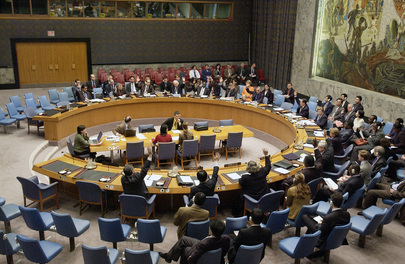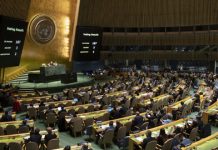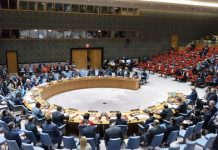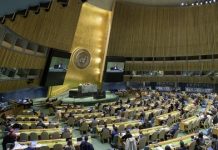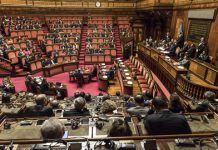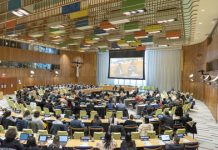Setting the stage for the discussions, Robin Geiss, Director of the UN Institute for Disarmament Research (UNIDIR), highlighted the blistering pace of scientific developments across fields like advanced robotics, 3D printing, generative AI and outer space.
While it took nearly 50 years for the 1880s electric grid to reach 100 million homes, ChatGPT achieved the same milestone in just two months in 2022.
“This points to a drastic compression of the time available to policymakers to react and adapt to scientific and technological advances in today’s world,” Mr. Geiss said.
“At the same time, the increasing convergence of different technologies, combined with their inherent dual-use nature, can lead to far-reaching and unintended consequences,” he added, noting the complexities of breakthroughs in science, technology and the impact on society at large.
Future of global security
Mr. Geiss drew attention to quantum technology, which in as little as five to ten years could have multiple and significant impacts on global security.
Quantum computing, he explained, could disrupt information and communication security by rendering traditional encryption techniques obsolete. At the same time, it could revolutionize warfare by enabling sensors to detect objects underground or underwater.
“Quantum computing will unlock a new era for AI by enabling computation of models that cannot currently be run on even the most powerful computers,” he said.
Looking ahead, Mr. Geiss predicted that the next decade would also see major advances in artificial general intelligence (AGI), which would be able to “understand, learn, and apply” knowledge across a wide range of contexts.
“This profound shift would have far-reaching consequences throughout society,” he added, calling for urgent action to anticipate both the threats and opportunities posed by these emerging technologies.
Security Council meets on anticipating impact of scientific developments on international peace and security.
Neurotechnology: Reconnecting brain and body
Also briefing the Security Council were Professors Jocelyne Bloch and Grégoire Courtine, who presented cutting-edge neurotechnological advancements with the potential to transform lives, while raising critical ethical and security concerns.
Prof. Bloch, a Swiss neurosurgeon, outlined her team’s development of a “digital bridge” between the brain and the spinal cord – a technology that enables paralyzed patients to walk again by bypassing spinal cord injuries.
The spinal cord controlling leg movement is intact, “just disconnected from the brain,” she said. By implanting electrodes in both the brain and spinal cord, and using artificial intelligence to decode brain signals, this system restores natural movement.
“We recently restored arm mobility in a tetraplegic patient and plan to extend the therapy to paralyses linked to strokes and neurodegenerative diseases such as Parkinson’s disease,” Prof. Bloch said.
Professors Jocelyne Bloch (left) and Grégoire Courtine (right) brief the Security Council.
Opportunities and ethical challenges
Prof. Courtine, a French neuroscientist, spoke about the broader societal impact of these advancements.
“This progress will have a significant impact on the lives of many people, including young athletes who have suffered injuries, soldiers returning from combat paralyzed, or civilians who are collateral victims,” he noted.
Beyond individual benefits, the widespread application of neurotechnology would also ease social and economic burdens. However, he cautioned that brain-machine interfaces, like those used in their research, could be exploited for non-therapeutic or military purposes.
“Our patients can already control drones with their thoughts,” he warned, warning that such capabilities could be used by healthy individuals for non-medical purposes, potentially raising new security risks.
Science fiction becomes reality
The rapid development of neurotechnology also introduces vulnerabilities. Devices like the “digital bridge” are susceptible to disruptions from electromagnetic fields or hacking, which could compromise critical neurological data.
“We are at a key moment in history,” Prof. Courtine said.
“What was science fiction a few decades ago is gradually becoming reality. It is our collective responsibility to shape this new era in an ethical and safe manner, while opening the doors to life-changing advances.”
Source of original article: United Nations (news.un.org). Photo credit: UN. The content of this article does not necessarily reflect the views or opinion of Global Diaspora News (www.GlobalDiasporaNews.com).
To submit your press release: (https://www.GlobalDiasporaNews.com/pr).
To advertise on Global Diaspora News: (www.GlobalDiasporaNews.com/ads).
Sign up to Global Diaspora News newsletter (https://www.GlobalDiasporaNews.com/newsletter/) to start receiving updates and opportunities directly in your email inbox for free.


